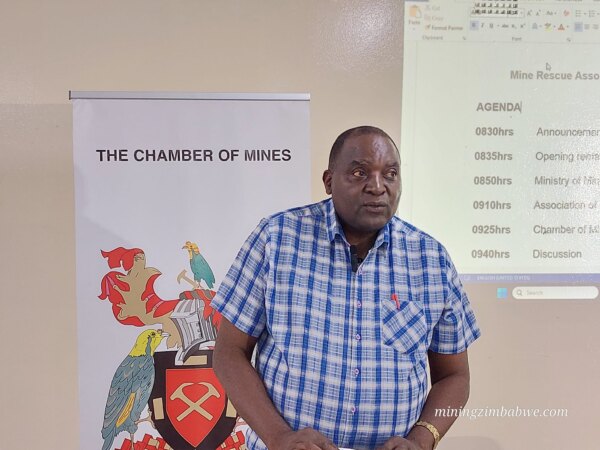Deputy Chief Government Mining Engineer Tapererwa Paswavaviri has expressed grave concern over the rising number of accidents and fatalities plaguing the mining sector.
Kelvin Sungiso
Drawing attention to the alarming statistics at the Mine Rescue Association of Zimbabwe (MRAZ) Annual General Meeting 2024 underway in Zvishavane, Engineer Tapererwa Paswavaviri underscored the urgent need for collective action to address safety lapses within the industry.
“Mr. President (MRZ), as the Ministry of Mines and Mining Development, it is to our huge concern that serious accidents and fatalities are increasing each day,” stated Paswavaviri highlighting the severity of the issue.
Paswavaviri revealed that in 2023 alone, the mining sector witnessed 212 accidents and 237 fatalities, marking a significant rise compared to previous years.
Of particular concern were the disparities in accident rates among different mining operations. “14% were from mines registered under the Chamber of Mines, 71% from illegal mines not registered under the Chamber of Mines, and 15% being legal miners,” noted the engineer Paswavaviri.
He further emphasized the concerning trend of escalating fatalities.
“From 2022 to 2023, the fatal accidents statistics sharply increased by 28%,” revealed the engineer, signalling a troubling trajectory in safety outcomes within the sector.
However, amidst these challenges, the Engineer said so far in 2024 fatalities have reduced by 23%
“In this year from January to date, accidents and fatalities have reduced by an average of 23% compared to 2023,” he said
To address the root causes of accidents, the Ministry of Mines and Mining Development has ramped up its intervention measures Paswavaviri announced.
“My office has increased the frequency in mine inspections and SHE (Safety, Health, and Environment) awareness campaigns,” he said.
One notable initiative highlighted in the speech was the Small Scale Miners Training program, launched to equip miners with essential safety knowledge and practices.
“In February, we embarked on a nationwide program for Small Scale Miners Training,” the engineer revealed, underscoring the ministry’s commitment to promoting a safety culture across all mining operations.
He concluded with a call to action for all stakeholders to prioritize safety and collaborate in mitigating risks within the mining sector.
“Together, we must redouble our efforts to ensure the safety and well-being of all miners,” Paswavaviri urged.
The Mine Rescue Association of Zimbabwe (MRAZ)
The Mine Rescue Association has been in existence since around 1973. Its mandate is to coordinate mine rescue activities in the country. The work of the association is coordinated through the Mine Rescue Working party. This working party brings together the Chairman appointed by the Association of Mine Managers of Zimbabwe, zone coordinators, the national trained, the national coordinator, a representative of the Chamber of Mines and a committee member.
The mandate of the working party is to organise and coordinate activities of the association to ensure that the teams are at all times in conditions to undertake rescues in irrespirable foul atmospheres. The decision to have a mine rescue team rests with the authority of ach operation. Mines that are at risk of underground fires are encouraged to operate mine rescue teams. The Mine Rescue Association of Zimbabwe is organised as follows:
i.North Zone: Bindura Nickel, Redwing Mine
ii.Central Zone: ZIMPLATS Ngezi, ZIMASCO Shurugwi
iii.South Zone : Renco Mine, Gaths Mine, Mimosa Mine
iv.West Zone : Hwange Colliery 1, Hwange Colliery 2, How Mine




